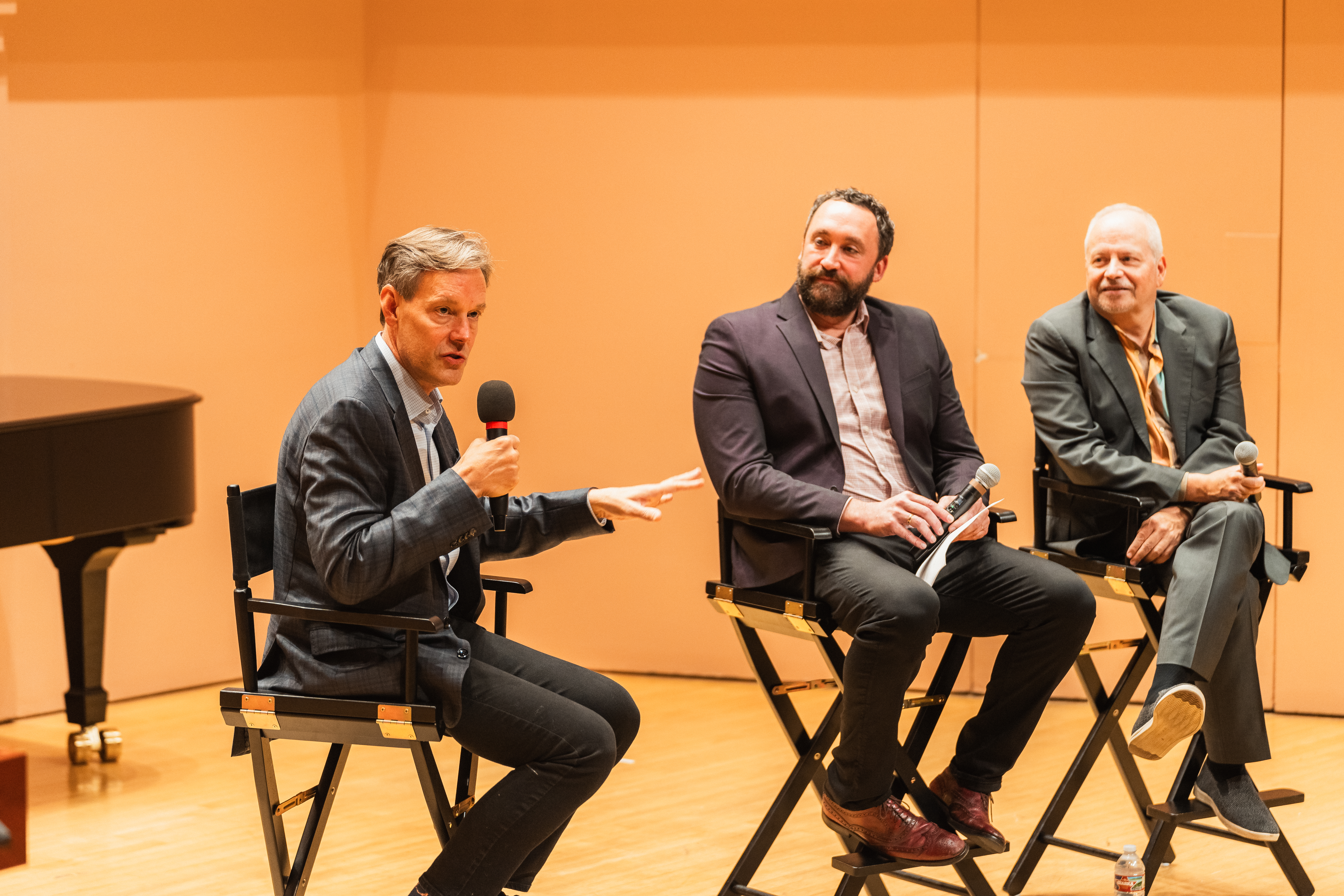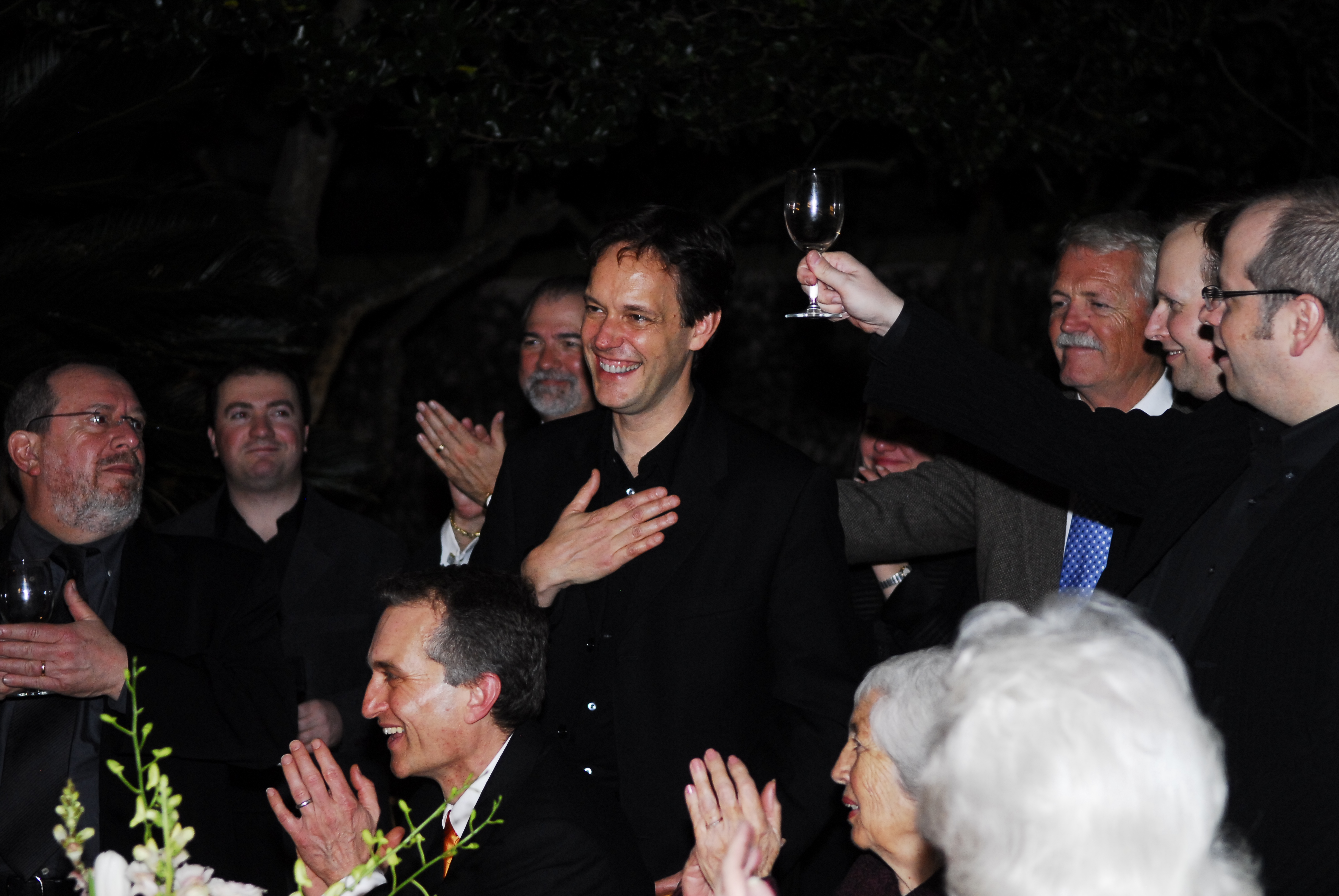Jake Heggie in Conversation at Rice
It’s a major moment for composer Jake Heggie. Not only is HGO preparing to open its 2023-24 season with the October 20 world premiere of Intelligence, his new opera with librettist Gene Scheer and director/choreographer Jawole Willa Jo Zollar—but his hugely successful first opera from 2000, Dead Man Walking, also just launched the Metropolitan Opera’s season.
On September 18, while in Houston for rehearsals of Intelligence, Heggie joined HGO Artistic and Music Director Patrick Summers and Rice University Director of Opera/Professor of Opera Studies Joshua Winograde at the Rice Shepherd School of Music for a fascinating and wide-ranging conversation.
Heggie’s gifts are such that he is not only America’s leading opera composer, he’s also an incredible writer and storyteller. Here are just 10 of the 100 interesting things we learned about his life, career, and more during the lively discussion at Rice.
1. Jake Heggie once worked in PR. He developed focal dystonia in his right hand in his late twenties, which meant his hand curled into a fist when he played the piano. It would take him years to retrain his hand, and in the meantime, he started writing about music, taking a job in the press department at San Francisco Opera. “It turned out to be the greatest apprenticeship possible for an aspiring opera composer,” he said, “although I did not know I was an aspiring opera composer.”

2. Heggie and Patrick Summers’s great friendship started at SFO in the mid-’90s. Summers describes them and their circle as the “misbehaving young kids of the San Francisco Opera at the time.”
3. Included in that circle were Frederica von Stade and Renée Fleming. “We all had so much fun, and it was such an adventure,” Heggie remembers. After five years his hand finally healed; he could play the piano again; and he wrote a song for von Stade, who performed it in recital. That opened one door, and then another and another…
4. Summers helped Heggie get his first major break. “It was 1995,” Summers recalled. “Lotfi [Mansouri, the General Director of SFO] mentioned to me, ‘You know, we have this famous composer, André Previn, writing an opera in 1999. In 2000, I think we should invest in a composer that nobody’s ever heard of. And who would that be?’ And that was a very Lotfi thing to ask, you know? And I said, ‘Well, how about Jake?’”
5. The minute librettist Terrence McNally suggested turning the film Dead Man Walking into an opera, Heggie was in. “All of a sudden,” Heggie said, “I just went, it fits right in line with the great trajectory of great tragic operas and stories, opportunities for ensemble solos, emotion big enough to fill an opera house, a sense of controversy…It just hit—it felt very American and universal. It felt of our time, timeless. All these things were shooting. I just was on fire with it.” It is now the most performed American opera this century. Summers would conduct both its 2000 world premiere in San Francisco, and the acclaimed production HGO presented in 2011.
6. Heggie puts Intelligence with Dead Man Walking and Moby-Dick as the “three major defining moments” of his career. “Intelligence has been quite a journey, right up through this year. And I have to tell you, rehearsals have been astounding. You are in for an experience unlike anything you’ve experienced in the opera house. The way Jawole has incorporated movement and dance into the telling of this story, in every corner of it—we’re not talking, there are set pieces. It’s every moment, there is something going on, and it’s extraordinary.”
7. His composing process involves “getting close to the characters and their language.” “The biggest thing is—once we have found the language, we have found the dramatic shape for this—finding the musical and rhythmic language in which these characters live so that their voices can emerge independently. And then just listening to them—not telling them how it goes, they tell me—and knowing them well enough that I could go for a walk on the beach with any one of these characters and still have a conversation outside of the context of the opera. That’s how well I know them… And then I just start listening, and it starts to emerge.”
8. He has wonderful advice for young musicians, including the Rice students in the room that day. “When you’re studying and you’re in school, it is about technique, technique, technique… What’s important, though, is as you’re perfecting that technique, to explore all the different ways you feel about things. Experience life. Go out there... Try food. Meet people. Have a well-rounded life as an artist and a singer. But while you’re doing all of that, be a great colleague. Reach out. Let composers know you’re interested in exploring work… This is the time in your life and career to network and meet these people and walk with them in the future. Being a good colleague, working hard, showing up—there’s nothing more important than being in the room, creatively.”
9. Heggie cannot wait for Intelligence to be born into the world. “This is something that is not your traditional opera, that requires music, words, and movement to be told and understood. And it’s beyond anything that I could ever have imagined. I’m just so excited about it. And that’s because HGO was willing to take a chance. And the company has stood staunchly behind it from day one.”

10. The composer considers HGO his “creative home.” “This is the seventy-fifth world premiere—my new opera—and my fourth big work for the company. It’s a safe space to be creative. I think the company is willing to take on risks, is willing to take on big, bold ideas in a way a lot of other companies are not.”